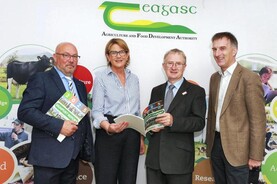The changing pattern of worm burdens on livestock farms is making effective treatments more difficult to administer, a leading expert on parasites has said.
Dr Philip Skuce from the Moredun Research Institute said milder and wetter winters are allowing liver fluke and its intermediate host, the mud snail, to remain active for longer than usual.
He said that as the risk period has moved later, there have been reports of acute disease, which is caused by a buildup of immature fluke, occurring as late as March.
Speaking at the National Sheep Association (NSA) event in Dungiven on Tuesday, Skuce said drier summers can also lead to a slower buildup of fluke, with surveillance finding some farmers are dosing up to four months too early.
“Fluke used to be strongly seasonal, but we are seeing infestations much later than in the past. It has got a bit random in some cases,” he said.
Skuce said the key to managing all types of parasites on livestock farms is making use of diagnostic tests, rather than using wormers based on certain calendar dates.
“I would rather you do testing and monitoring than routine treatments. That is the key to sustainable use of anthelmintics,” he said.
Skuce also advised against routinely treating livestock for rumen fluke, as it can eventually lead to resistance issues.
“There is little or no published evidence that it (rumen fluke) does anything to production,” he said.
Roundworms
A key issue with managing roundworms in lambs is resistance to wormers, although Skuce said this can change throughout the season on individual farms.
He explained that different species of roundworms “come and go” during the year and some species will be more resistant to wormers and will have a greater impact on liveweight gains than others.
Resistance
Skuce said up to 90% of NI sheep farms have issues with resistance to group one (white) wormers, with around 50% having problems with group two (yellow) products and up to 70% have some resistance to group three (clear) wormers.
However, he said there were only “one or two cases” of resistance to the group four (orange) wormer, and he was not aware of any resistance to the group five (purple) product.
It means these wormers can work well on sheep farms as a quarantine treatment for bought in stock, or as a late season treatment on lambs against resistant worms that build up throughout the season.
Taskforce meets with DAERA about new sheep scheme
Senior officials from DAERA met with representatives from various farming and industry groups on Tuesday to discuss a potential support scheme for the NI sheep sector.
The meeting took place before the NSA event in Dungiven where one of the public seminar sessions was focussed on available sheep support in the Republic of Ireland (ROI).
Between the National Sheep Welfare Scheme and the Sheep Improvement Scheme, payments worth up to €25 per ewe are available to sheep farmers in ROI.
“We are looking for something similar, with a focus on genomics and animal health. We are envious of our counterparts in the south,” said Clement Lynch from the NI sheep industry taskforce.
At Stormont on Monday, Agriculture Minister Andrew Muir said work to design a new sheep scheme in NI “will commence towards the end of this year”.
However, Glenn Cuddy from the Ulster Farmers Union (UFU) said the proposed timeline for developing a sheep scheme “was not good enough”.
“The excuse is they (DAERA) haven’t enough staff or they haven’t got round to it yet. It’s action we need now,” he told attendees at the NSA event.






 This is a subscriber-only article
This is a subscriber-only article











SHARING OPTIONS: